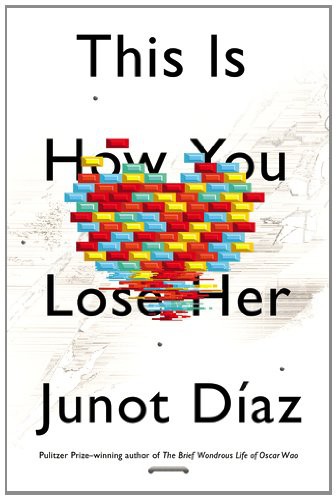
This Is How You Lose Her
کتاب های مرتبط
- اطلاعات
- نقد و بررسی
- دیدگاه کاربران
نقد و بررسی

Starred review from June 18, 2012
Decisively back in the form that permanently etched his name onto a list of unforgettable writers, Díaz (The Brief Wondrous Life of Oscar Wao) brings life to the short story with a voice that demands attention. Often caught between hopeless romanticism and flippant machismo, Díaz’s characters are as vulnerable and maddening as they are endearing and sexy. Among other familiar voices in this collection, Yunior reappears, older but not necessarily wiser, particularly as his once invincible brother Rafa struggles with cancer and everything else it means to be sick, poor, and uninsured. But as the title reveals, the beautiful, defiant, and impossible ladies that claw away at Yunior’s soul drive this book. As before, Díaz’s searing, sometimes hilarious, and always disarming language holds everything together with just enough of a sense that it all could fall to pieces in the process—if it hasn’t already. Drown inspired an entire generation of imitators and with this collection, readers will remember why everyone wants to write like Díaz, bring him home, or both. Raw and honest, these stories pulsate with raspy ghetto hip-hop and the subtler yet more vital echo of the human heart. Agent: Nicole Aragi.

August 15, 2012
From the author of Drown (1996), more tales of Dominican life in the cold, unwelcoming United States. Eight of the collection's nine stories center on Yunior, who shares some of his creator's back story. Brought from the Dominican Republic as a kid by his father, he grows up uneasily in New Jersey, escaping the neighborhood career options of manual labor and drug dealing to become an academic and fiction writer. What Yunior can't escape is what his mother and various girlfriends see as the Dominican man's insatiable need to cheat. The narrative moves backward and forward in time, resisting the temptation to turn interconnected tales into a novel by default, but it has a depressingly unified theme: Over and over, a fiery woman walks when she learns Yunior can't be true, and he pines fruitlessly over his loss. He's got a lot of other baggage to deal with as well: His older brother Rafa dies of cancer; a flashback to the family's arrival in the U.S. shows his father--who later runs off with another woman--to be a rigid, controlling, frequently brutal disciplinarian; and Yunior graduates from youthful drug use to severe health issues. These grim particulars are leavened by Diaz's magnificent prose, an exuberant rendering of the driving rhythms and juicy Spanglish vocabulary of immigrant speech. Still, all that penitent machismo gets irksome, perhaps for the author as well, since the collection's most moving story leaves Yunior behind for a female narrator. Yasmin works in the laundry of St. Peter's Hospital in New Brunswick; her married lover has left his wife behind in Santo Domingo and plans to buy a house for him and Yasmin. Told in quiet, weary prose, "Otravida, Otra Vez" offers a counterpoint to Yunior's turbulent wanderings with its gentle portrait of a woman quietly enduring as best she can. Not as ambitious as Diaz's Pulitzer Prize winner, The Brief Wondrous Life of Oscar Wao (2007), but sharply observed and morally challenging.
COPYRIGHT(2012) Kirkus Reviews, ALL RIGHTS RESERVED.

April 1, 2012
Readers who adored The Brief Wondrous Life of Oscar Wao, winner of both a Pulitzer Prize and a National Book Critics Circle Award, have been waiting five long years for Diaz's next work. Here it is--a collection of short stories that focus on how love twists and turns us around.
Copyright 2012 Library Journal, LLC Used with permission.

Starred review from July 1, 2012
Diaz continues to keep company with his alter ego, Yunior, a Dominican turned New Jerseyan, in his second short story collection. Drown (1996), his first, introduced Yunior and established Diaz as a writer of promise. His first novel, The Brief Wondrous Life of Oscar Wao (2007), won the Pulitzer Prize and galvanized a world of new readers. Diaz's standout fiction remains pinpoint, sinuous, gutsy, and imaginative. Yunior kicks things off by stating, I'm not a bad guy. The women in his life would caustically disagree. We see Yunior as a boy new to America and his long-absent father's temper, a teenager and college student forever infatuated and forever cheating, and a lonely adult confronted by aggressive racism. Each taut tale of unrequited and betrayed love and family crises is electric with passionate observations and off-the-charts emotional and social intelligence. Diaz's involving, diverse characters include Yunior's combative brother Rafa, Magda the coldhearted, Nilda the young man-magnet, and a sexy older woman. Fast paced, unflinching, complexly funny, street-talking tough, perfectly made, and deeply sensitive, Diaz's gripping stories unveil lives shadowed by prejudice and poverty and bereft of reliable love and trust. These are precarious, unappreciated, precious lives in which intimacy is a lost art, masculinity a parody, and kindness, reason, and hope struggle to survive like seedlings in a war zone. HIGH-DEMAND BACKSTORY: Diaz, as compelling in person as on the page, will connect with his large and loyal readership via a national author tour, extensive media interviews, and a social media campaign.(Reprinted with permission of Booklist, copyright 2012, American Library Association.)

























دیدگاه کاربران